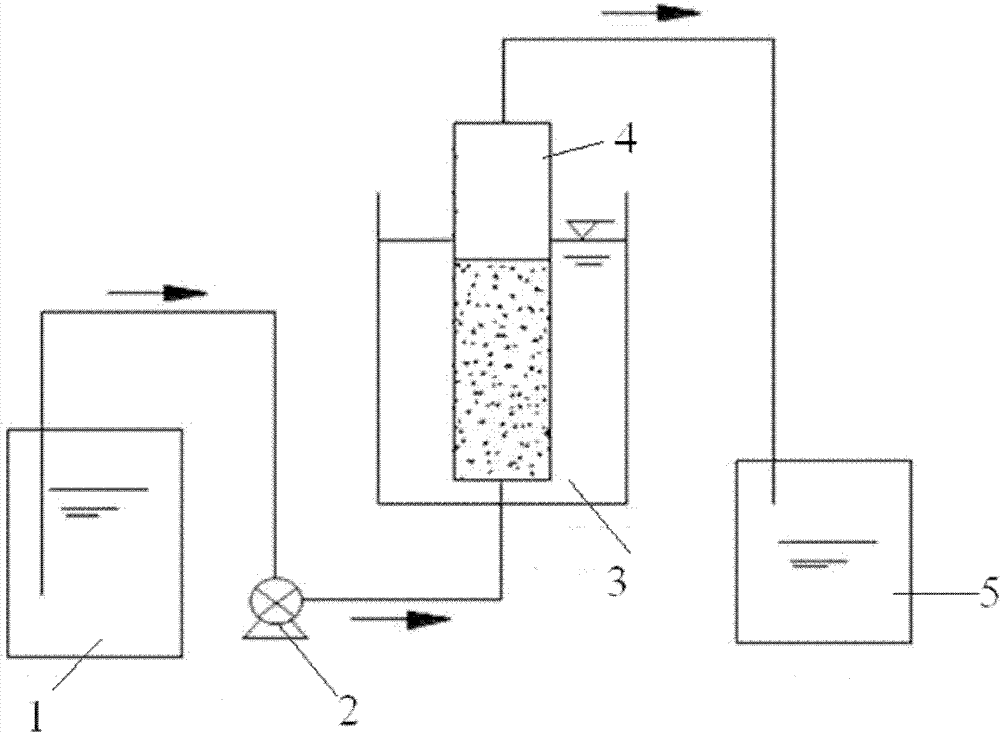Preparation method and application of crosslinked starch, polycaprolactone and polylactic acid mixture
A technology of polycaprolactone and cross-linked starch, which is applied in the direction of anaerobic digestion treatment, etc., can solve the problems of excessive dosing and difficulty in controlling the carbon-nitrogen ratio, reduce the cost of denitrification, shorten the start-up time, and overcome the carbon source investment. The effect of increasing the amount is not easy to control
- Summary
- Abstract
- Description
- Claims
- Application Information
AI Technical Summary
Problems solved by technology
Method used
Image
Examples
Embodiment 1
[0021] The preparation method of cross-linked starch, polycaprolactone and polylactic acid blend is carried out according to the following steps:
[0022] (1) Starch crosslinking: add 10g starch, 30g water and 0.7g sodium chloride in the reactor, adjust the pH to 9.5 with 0.5mol / L sodium hydroxide solution (adding 0.7g) under mechanical stirring, and heat up to Slowly add 0.8g of epichlorohydrin after 50°C, react at constant temperature for 8 hours, filter, wash, and dry to obtain cross-linked starch;
[0023] (2) Preparation of crosslinked starch, polycaprolactone and polylactic acid blend: 35g crosslinked cornstarch, 25g polycaprolactone (molecular weight 60000), 25g polylactic acid (molecular weight 40000), 11g glycerin, 4g water After stirring evenly, extrude and granulate in a twin-screw extruder at 120-175°C.
Embodiment 2
[0025] The preparation method of cross-linked starch, polycaprolactone and polylactic acid blend is carried out according to the following steps:
[0026] (1) Starch crosslinking: add 10g starch, 30g water and 0.7g sodium chloride in the reactor, adjust the pH to 9.5 with 0.5mol / L sodium hydroxide solution (adding 0.7g) under mechanical stirring, and heat up to Slowly add 0.8g of epichlorohydrin after 50°C, react at constant temperature for 8 hours, filter, wash, and dry to obtain cross-linked starch;
[0027] (2) Preparation of crosslinked starch, polycaprolactone and polylactic acid blend: 46g crosslinked tapioca starch, 14g polycaprolactone (molecular weight 40000), 14g polylactic acid (molecular weight 80000), 15g glycerin, 5g water After mixing 5g of wood flour and 1g of KH-560 silane coupling agent evenly, extrude and granulate in a twin-screw extruder at 120-175°C.
Embodiment 3
[0029] The preparation method of cross-linked starch, polycaprolactone and polylactic acid blend is carried out according to the following steps:
[0030] (1) Starch crosslinking: add 10g starch, 30g water and 0.7g sodium chloride in the reactor, adjust the pH to 9.5 with 0.5mol / L sodium hydroxide solution (adding 0.7g) under mechanical stirring, and heat up to Slowly add 0.8g of epichlorohydrin after 50°C, react at constant temperature for 8 hours, filter, wash, and dry to obtain cross-linked starch;
[0031] (2) Preparation of crosslinked starch, polycaprolactone and polylactic acid blend: 23.04g crosslinked cornstarch, 23.04g cornstarch, 14.11g polycaprolactone (molecular weight 40000), 14.11g polylactic acid (molecular weight 80000), 14.81g of glycerin, 4.94g of water, 4.95g of wood flour and 1g of KH-560 silane coupling agent were stirred evenly, and extruded and granulated in a twin-screw extruder at 155°C.
PUM
| Property | Measurement | Unit |
|---|---|---|
| particle size (mesh) | aaaaa | aaaaa |
Abstract
Description
Claims
Application Information
 Login to View More
Login to View More - R&D
- Intellectual Property
- Life Sciences
- Materials
- Tech Scout
- Unparalleled Data Quality
- Higher Quality Content
- 60% Fewer Hallucinations
Browse by: Latest US Patents, China's latest patents, Technical Efficacy Thesaurus, Application Domain, Technology Topic, Popular Technical Reports.
© 2025 PatSnap. All rights reserved.Legal|Privacy policy|Modern Slavery Act Transparency Statement|Sitemap|About US| Contact US: help@patsnap.com



